Entrepreneurship Education Conference at Ashoka University
InfoEdge Centre for Entrepreneurship Ashoka University organized a 2-day Entrepreneur Education Conference. It brought together a diverse cadre of speakers, panellists, and experts from the domains of academia, incubators, accelerators, government officials, policymaking, and entrepreneurship. The conference discussed, deliberated, and recommended strategies for shaping entrepreneurship education.
The conference dialogue covered important facets of entrepreneurship education in India and worldwide. The participants sought:
- comprehensive understanding of entrepreneurship education;
- to share knowledge on the scope of ed-tech in entrepreneurship;
- to understand the academic infrastructure defining pedagogy in the field;
- to understand the policy-level efforts in nurturing entrepreneurship education;
- understanding the ecosystem for entrepreneurship education in India and worldwide
The sessions conducted were:
Building Entrepreneurial Universities and Growth Mindset

The first session of the conference discussed the importance of building entrepreneurial universities and the growth mindset of students. The invigorating conversation between Prof. Rishikesha Krishnan, Director IIM Bangalore, and Dr Pramath Raj Sinha, Founder & Trustee, Ashoka University, highlighted the significance of having a clear vision and goal setting by the institutions teaching entrepreneurship. In addition to this, the role of building inquisitive minds, skills, and entrepreneurial culture was discussed.
Prof. Krishnan shared that ‘teaching entrepreneurship using conventional lectures, flipped classrooms, online platforms, and through various other methods are already being practised by several universities across the globe. The key is to make entrepreneurship education an experiential learning process for the students by fostering the growth mindset versus the fixed mindset.’ This is related to the effectiveness the educators demonstrate in delivering content in their classrooms that can support students’ innovation from the ideation stage, deferred placement up to incubation as shared.
Global Trends in Entrepreneurship
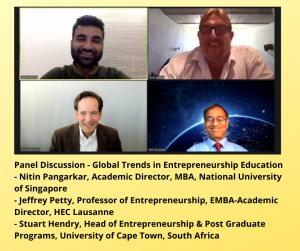
The power-packed session on Global Trends in Entrepreneurship Education had remarkable panellists like Prof. Nitin Pangarkar (Academic Director, MBA, National University of Singapore), Prof. Jeffrey Petty (Professor of Entrepreneurship/EMBA Director, HEC Lausanne (Switzerland)), and Prof. Stuard Hendry (Head of Entrepreneurship & Post Graduate Programs, and University of Cape Town, South Africa). This session was successful in establishing a base for expanding our knowledge around the current and potential future trends in Entrepreneurship Education and its impact on generating safe business opportunities for the students, right from the academic institutions.
Nurturing the creative, innovative, and entrepreneurial mindset
The discussion on nurturing skills and mindset became even more stimulating when Prof. Neharika Vohra, Vice-Chancellor – Delhi Skills and Entrepreneurship University, shared her thoughts on how entrepreneurs are perceived in general. She expressed, ‘entrepreneurs
are not always the ones who develop a business, run it, and live happily after. On the contrary, this attitude needs to be changed, and their university is constantly putting effort into building a mindset that is channelized towards recognizing a challenge or an issue and converting it into an opportunity and/or business.
The Liberal Arts Context and Entrepreneurship
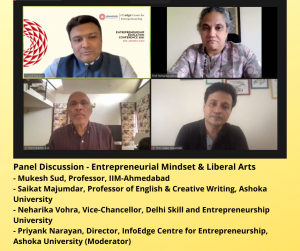
Entrepreneurship has been the fastest growing area of study in various business and engineering schools and colleges for a decade now. Nonetheless, universities are putting effort into introducing entrepreneurship programs in liberal art schools as well. With an aim to draw students’ attention and increase the economic utility of undergraduate degrees, many business degree colleges and universities have been rising, and only a small percentage of twenty-first-century college students are choosing liberal arts majors. This is because students in liberal arts are still not actively taught about domains of entrepreneurship education in many countries like India. In this session, Prof. Mukesh Sud, Professor, IIM Ahmedabad, Prof. Saikat Majumdar, Professor, Ashoka University, and Prof. Neharika Vohra, Vice Chancellor – Delhi Skills and Entrepreneurship University, focused on entrepreneurial studies as a growing field in liberal arts courses at higher education.
Prof. Saikat said, ‘liberal arts courses need to position practical skills to generate skills like decision making, empathy, and critical thinking, which are crucial for a growth mindset’. Similarly, the liberal arts and entrepreneurship share the same critical, forward-thinking, solution-driven approach. He further mentioned the Gartner theory that being entrepreneurial can mean different things to different people based on their experience and learning. Entrepreneurship education thus focuses on the process of learning in which individuals, either on their own or inside organizations, pursue opportunities and reach their goals.
Keynote Speech Manish Sisodia, Govt of Delhi
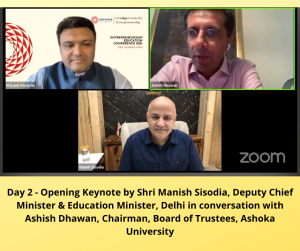
“India now has to be a nation of job providers rather than job seekers to raise the economy of the country. Delhi govt has launched an entrepreneurship mindset curriculum to deal with joblessness, economic slowdown”, shared Mr Manish Sisodia, Education Minister, Govt of Delhi, while in conversation with Ashish Dhawan, Chairman of the Board of Trustees, Ashoka University.
To facilitate this, the Delhi government’s flagship Entrepreneurship Mindset Curriculum program was launched in 2019 for Classes 9 to 12 in all Delhi government schools. This curriculum is all about developing an overall entrepreneurial mindset, approach, and skills among students. Mr Sisodia elaborated that the curriculum will inspire students through various entrepreneurial stories, case studies, and many mindfulness activities and approaches. It emphasizes building the individual character traits of a successful entrepreneur in addition to the business aspects of entrepreneurship.
Mahabharat & Entrepreneurship
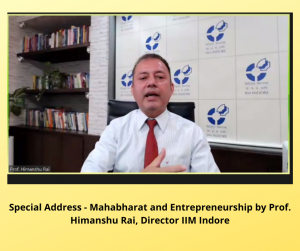
Prof. Himanshu Rai, Director IIM Indore, during his session on Mahabharat and Entrepreneurship, said that the Vedic scripture is an unlimited source of knowledge and has solutions to different challenges and barriers. Explaining about creating innovative ecosystems, he spoke about two major barriers which an individual might face during their entrepreneurial journey. One is the fear of losing control; for example, funding might dilute. In this case, he said it was ideal for focusing on the strengths of your business model. Second, more paramount in the context of entrepreneurship, is the fear of failure. In this case, a motivated team can keep the spirit of an entrepreneurial journey alive.
Entrepreneurship Education and Effectuation
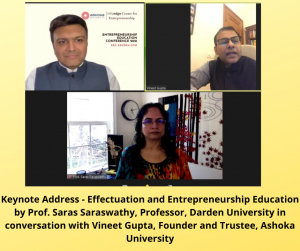
Drawing insights from the session around network building and effectuation theory, Prof. Saras D. Sarasvathy shared her thoughts by elaborating an effectual approach to network-building, which is positively associated with the validating of a business model and the intervention scope. The effectual approach is backed by scientific research with observations of situations of uncertainty.
Prof. Sarasvathy explains that effectuation refers to the lessons that experienced entrepreneurs learned while building their ventures and entrepreneurial journey. Effectuation essentially distinguishes this journey, as they have faced different challenging scenarios in entrepreneurship, ranging from failure to success and the lessons and insights that they have gained along the way.
Entrepreneurship: Research, Innovation, Ed-tech
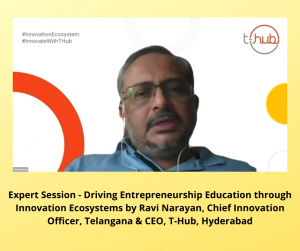
This session had eminent speakers like Shreyasi Singh (CEO, Harappa Education), Ravi Narayan (Chief Innovation Officer, Telangana), and Amit Karna (Professor, IIM Ahmedabad). The speakers highlighted important takeaways on the topics of Leveraging Ed-tech for Entrepreneurship Education, Driving Entrepreneurship Education through Innovation Ecosystems, and Emerging Trends in Entrepreneurship Research, respectively.
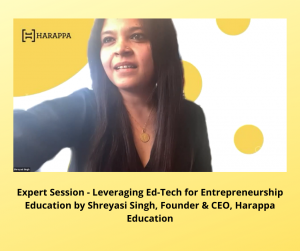
Prof. Amit Karna shared that the year 2020 recorded the highest number of Indian startups entering the unicorn club in his dialogue on the Emerging Trends in Entrepreneurship Research. He rendered some valuable insights on the effectiveness of the current entrepreneurial ecosystem and ways to measure it. Prof. Karna further added that while as a country, India is moving towards an effectual and growth mindset, it is also significant to explore the changing landscape of valuable systems. As researchers, the need is to study and adopt new perspectives and views on entrepreneurship education.
Incubators, Accelerators and Entrepreneurship Education
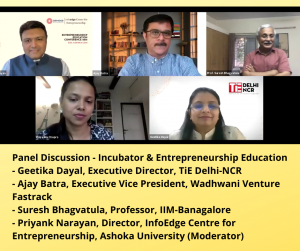
The session on Incubators, Accelerators and Entrepreneurship Education invited Geetika Dayal, Executive Director, TiE Delhi NCR, Ajay Batra, Executive Director, Wadhwani Foundation, and Prof. Suresh Bhagvatula, Professor IIM Bangalore, to share valuable insights. The session was moderated by Dr Priyank Narayan, Director, Centre for Entrepreneurship, Ashoka University.
Dr Priyank opened the session by debating methods of bridging the gap between the entrepreneurship classrooms offering theoretical content and entrepreneurship incubators offering practical assistance. Prof. Suresh mentioned that the challenge is that society looks at entrepreneurship merely as an optional career. An understanding that an individual can be entrepreneurial in either their job or startup venture needs to be promoted.













